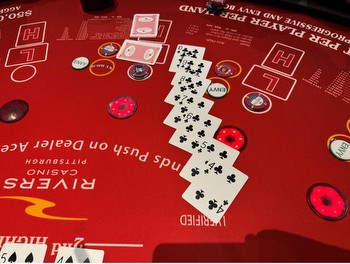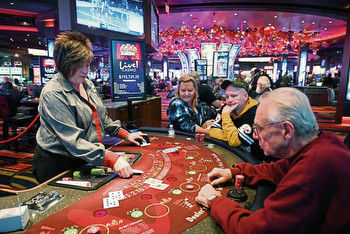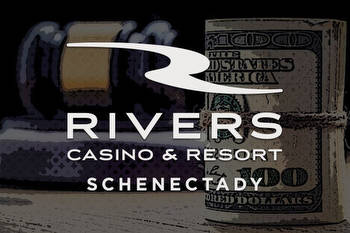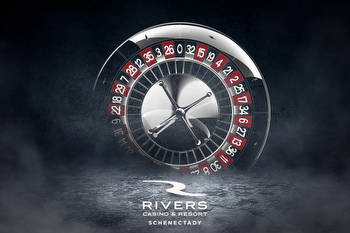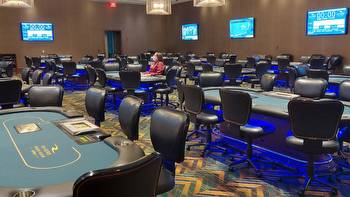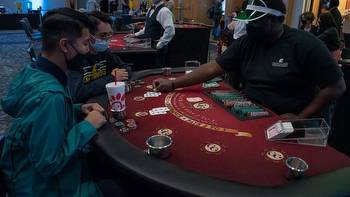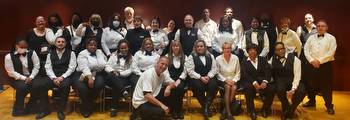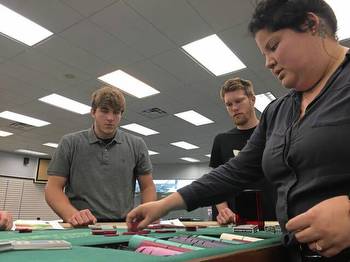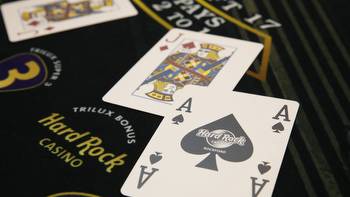Cards on the table: Rivers Casino molds its newest class of dealers
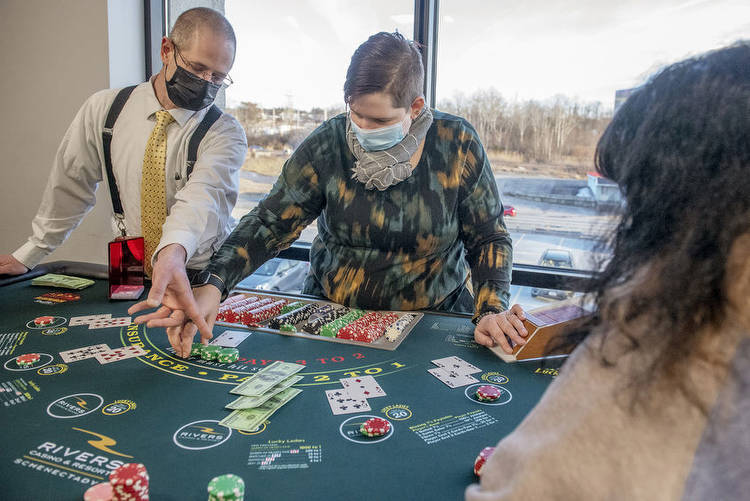
SCHENECTADY — Pick a card … but not just any card. And pick it with perfect form.
The many rules that dealers at Rivers Casino Schenectady must follow may seem overwhelming at the start. But with time and practice comes skill and confidence.
The Daily Gazette joined the latest class of new table game dealers this week as they finished their training and prepared for their auditions. If they receive their state license, they’ll be out at the blackjack tables as early as Dec. 29, stacking up chips and dealing out cards.
With a workforce of about 900, Rivers Casino & Resort is one of the city’s largest employers, but it’s struggling like other businesses large and small with recruitment.
Free training and a good paycheck are among the recruiting tools for those who’ll work on the casino floor. But one of the biggest draws is the casino itself — the best dealers enjoy being there and exude that enjoyment in a way that rubs off on players, says Dominic Cardillo, a pit boss and floor manager who doubles as manager of the casino’s Dealer Academy when it’s in session.
“People that do have experience gambling, a lot of them feel like it would be fun to give it a try, be on the other side of the table,” he says.
NOT IN THE CARDS
That would not be me.
I gamble with people’s patience sometimes but rarely with money.
My card-playing experience is limited to Crazy Eights with my dad 50 years ago, then Go Fish with my son 20 years ago.
If nothing else, I’m within the age range of the students in this class: early 20s to late 50s.
And it does look fun, or at least interesting.
So I step into position and Cardillo walks me through dealing a hand of blackjack to a table ringed with imaginary casino guests.
Draw the card with the left hand, pass it to the right hand, place it in front of the player’s chips.
Where exactly, I ask?
“We’ll try to deliver each card to the bottom and just to the right of each betting circle,” he says. “Then you’ll deal everybody their second card and we’ll have it covering only a quarter of the bottom right hand side.”
How’s that for being precise?
There’s a 39-page procedure manual filled with details like these.
We play a second hand and I actually remember most of what Cardillo taught me in the first hand.
“You’re doing pretty good,” he says.
When the second hand is complete, I ask: “How many rules have I broken in our 15 minutes here?”
“Not too many!” Cardillo replies.
VOICE OF EXPERIENCE
Cardillo seems like the right person for the job: The Saratoga Springs native is a former dealer himself (mainly craps rather than cards) and worked 15 years in Las Vegas before returning to this region to work at Rivers in 2018. He projects the easygoing competence and enthusiasm that he says a dealer needs to have.
“One of the main aspects I try to instill early is positivity,” he says. “It’s a lot easier to learn when you’re having fun. As soon as you pass your audition, go out and have a good time. Everything will fall into place after that.”
I speak to a few students, each out of earshot of the others, and in different words they all say the same thing: He’s a supportive teacher who makes the endless practice, math calculations and rule-learning fun over the course of six weeks.
The learning is all for a reason: Enhancing guest experience while accurately dealing cards and handling money.
“When you think about it, there’s so much exposed money out here that everything has to be done a specific way,” Cardillo says.
Attitude and knowledge are key but absolute perfection isn’t required: One member of this class of students sprayed cards all over the table while shuffling during the final audition and still passed.
Mistakes happen and the game continues.
FAST LEARNER, OR NOT
I make a flub of my own that would require a visit from the floor manager if it happened in a real casino: I draw two cards instead of one for my imaginary player.
Don’t worry about it, Cardillo says, moving me along to something I won’t flub.
I think he might be the opposite of the carnival barker deliberately trying to rattle people as they go for the prize: He’s intentionally steering me to things I’ll get right to build my confidence.
Percentages are easy for me and I calculate the 3-2 payout before he even explains how to do it.
I remember what the unmarked chips are worth after being told just once.
I’m surprisingly deft scooping up the players’ cards with one hand.
But then I dump all those cards while trying to scoop up my own in the same fluid motion.
FUN AND MONEY
So what’s the attraction of the job: fun or money?
Both, Cardillo says.
His firm opinion is that someone needs to enjoy being a dealer to do it well, but the job does start at $20 an hour plus benefits plus tips, or toke. And a minimum tip is contractually specified.
“A guaranteed toke rate is pretty incredible,” Cardillo says.
“I’ve been in this industry 19 years now and this is the first casino I’ve ever worked at that had a guaranteed toke rate.”
Rivers Schenectady is also his first unionized casino.
Taylor Lennon, 22, of Waterford, is there for both reasons: fun and money.
“It’s definitely a fun environment,” she says. “You start out making a lot more than I’m making right now.”
It’s a career change for her — she’s now a receptionist at a medical clinic and previously was a lifeguard and childcare provider.
Her brother started as a poker dealer at Rivers Schenectady on opening day in 2017 and soon was promoted. After the COVID layoff in 2020, he returned and is now a manager. She’s heard from other people that those who commit to the job have opportunities to advance.
“You just have to be consistent with it. You have to want to go further,” Lennon says.
EASY COME, EASY GO
Let’s see what you’ve learned, I say to Lennon, snagging five of her fake $20 bills and buying $100 worth of chips from her.
“Changing a hundred,” she calls out. Cardillo acknowledges from across the room.
She lays out and counts the money, then counts out 20 chips worth $5 each, all with practiced precision.
I bet $50 on the first hand. Lennon deals us two cards each and I need more — my two-card total is nowhere near 21, the winning number.
“Hit me!” I say, then remember I need to use hand signals for benefit of the many security cameras in the casino.
At least I didn’t blurt out “Go Fish!”
I thump the table for another card, which brings the total face value to 16, then tap the table again, which brings me to 22.
That’s one too high. I lose. The house is $50 richer.
Lennon whisks my chips away without comment.
(That’s part of the script: “We tell dealers to take it quickly and softly,” Cardillo says.)
Smarting from the loss, I bet only $20 on the next hand.
Too bad: Her third card brings her to 23 and I’m holding at 19.
“You win,” she says, sliding my proceeds across to me.
I give her a chip as a toke and quit while I’m behind.
“You gave her a $5 tip? You’re cheap!” my camera-wieldingcolleague Erica Miller declares.
CALMING PRESENCE
But what about the patrons who aren’t as affable as John Cropley (usually) is?
Surely there are a few sore losers among the Rivers guests who played $164 million on table games in the first 11 months of this year and lost $34 million of it.
Cardillo says that’s part of the training. Being a pleasant and perky dealer goes a long way to calming nerves, but some players are more high-strung than others.
“One of the most important aspects about being a dealer is to be able to differentiate when a player is actually talking directly towards them [or] talking to the table and the cards,” Cardillo says.
The message to the unhappy player is, “Don’t blame the dealer, blame the cards,” he adds. “We don’t give dealers many options on the outcome of the hand.”
Tara Holcomb of Amsterdam, a former retail worker who is re-entering the workforce after 11 years as a stay-at-home mother and care assistant, says she’s prepared for that type of scenario.
“I’m pretty good about keeping things positive,” she says.
Dealers are not actively trying to beat the players, Cardillo says, and the rules prevent them from trying.
If a dealer’s first two cards add up to less than 17, they must take a third card. If the first two add up to 17 or more, they cannot take a third card, unless one or both of the first is an ace.
The player wins or loses on the luck of the draw, not the dealer’s strategy.
SIX WEEKS LATER
The class has grown friendly in their six weeks together. A few minutes into Monday’s four-hour session, chattering voices, clicking chips and rasping card shuffles fill the room.
Journei Torres, 23, of Albany passed her audition well before the academy was finished; about half of the other students had to re-audition. (It’s an unusually high percentage, Cardillo says. They let their nerves get to them.)
Torres has worked mainly in retail and essentially started from square one at dealer school.
“I didn’t know a lot about cards,” she says. “I don’t even know how to play spades. My mom has been trying to teach me for years, it just never took.”
A friend works at Rivers, and the job sounded interesting, Torres says. Cardillo made it seem doable, she added.
“He really helped us find different ways because everyone doesn’t learn the same. He helped us individually and he brought us together as a group.”
WORK BEGINS
The new dealers will start out on blackjack. Down the line, they’llget a raise if they add other games to their skillset.
Lennon would like to branch out to the roulette wheel when she gains some blackjack experience. The craps table? Not so much.
“Craps is the hardest game to learn in the casino,” Cardillo says, “because you have to know how to pay money in about nine different sets of odds — and pay the reverse.
“Blackjack, when it comes to the math, is pretty easy.”
Holcomb is going to stick with blackjack for a while before considering other training.
And Torres, who has excelled at a card game she previously knew nothing about?
“I actually want to learn poker,” she says.
The six-week academy ended Thursday, with 13 of the 14 students passing their audition. If their state licenses come through in time, the first of them will be hired and begin orientation on the casino floor Wednesday.
The Dealer Academy will reconvene Jan. 3, when a new group will start their six weeks of training.








